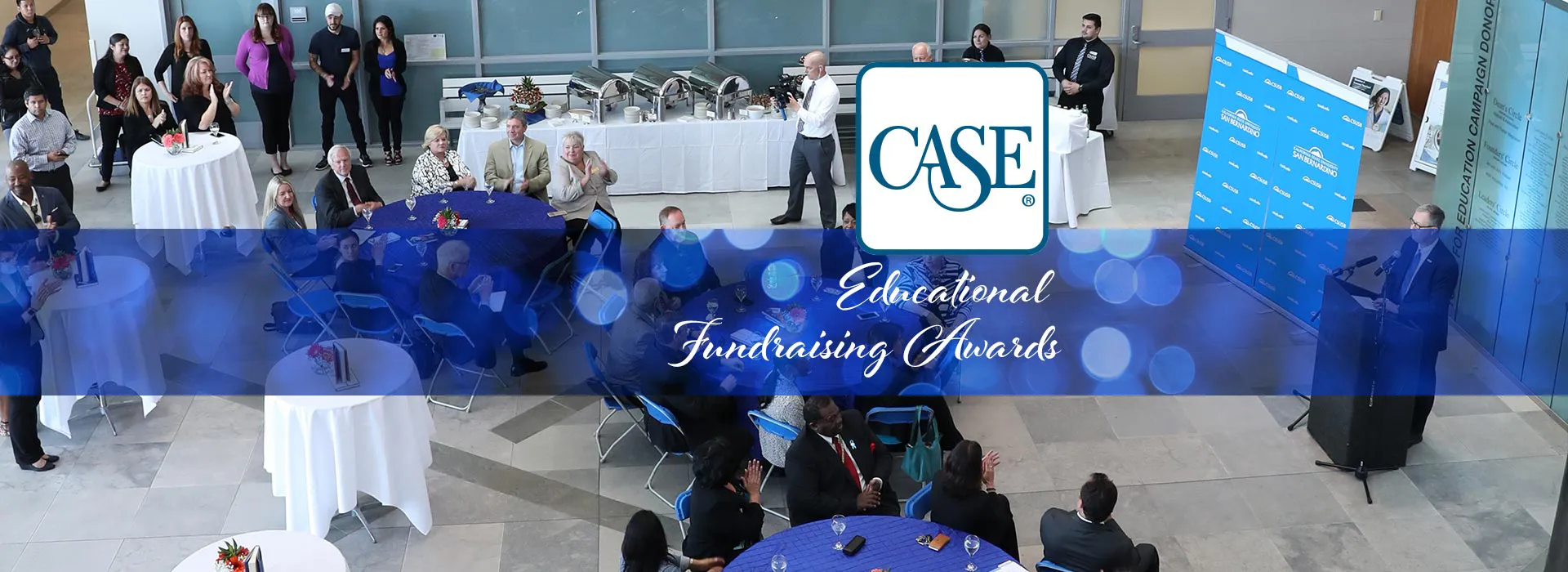Joe Gutierrez Office of Strategic Communication (909) 537-5007 joeg@csusb.edu

Cal State San Bernardino has been named a recipient of a 2019 Educational Fundraising Award for its exceptional fundraising programs by the Council for Advancement and Support of Education (CASE).
“CASE’s Educational Fundraising Awards recognize exemplary fundraising programs and activities. Your institution has not only demonstrated the highest levels of professionalism and best practice in its fundraising efforts, it has contributed to the betterment of educational advancement worldwide by serving as a model to which others can aspire,” said Sue Cunningham, CASE president and CEO.
“CSU San Bernardino is being recognized for Overall Improvement, based on the judges’ blind analysis of three years of fundraising data your institution submitted to CASE’s AMAtlas Voluntary Support of Education Survey (VSE). Congratulations!” wrote Cunningham in a letter to Robert Nava, the university’s vice president for Advancement.
The Overall Improvement Award is given to colleges and universities that demonstrate significant program growth across three years of data. CSUSB joins more than 90 other institutions of higher education in the country being honored with a 2019 Educational Fundraising Award.
CSUSB President Tomás D. Morales said the university was greatly honored by the award and credited the university’s Division of Advancement for its commitment to serving the university.
“The CASE 2019 Educational Fundraising Award recognizes something that we here at Cal State San Bernardino have known for a long time. Our advancement team is comprised of an enthusiastic group of creative professionals who do amazing work and are dedicated to serving this university and its students,” Morales said.
CSUSB is also one of 39 institutions being recognized for the first time – a record number since the awards were established in 2002.
The Educational Fundraising Awards annually recognize exemplary development programs based on a blind review of data submitted to the CASE AMAtlas Voluntary Support of Education (VSE) survey. CASE member institutions that have participated in the VSE for the past three years are automatically considered.
CASE members have access to all of the benchmarking data used to determine winners, as well as fundraising data for scores of other U.S. and Canadian institutions through the online Data Miner tool that is part of CASE's AMAtlas. Users have access to 10 years of survey data from more than 1,000 survey respondents.
“The beauty of this awards program is that we look at the data not knowing what institution is being represented. In showcasing these best-of-the-best programs, CASE helps its members identify institutions doing smart and innovative work from which everyone can learn,” said Sue Kubik, an accomplished educational fundraiser and longtime CASE volunteer who led the judging panel this year. “We not only encourage – we highly recommend – that you spend some time in the CASE VSE Data Miner to dive into details about what makes these programs aspirational.”
Fundraising success is measured in much more than who raises the most money. Again this year, CASE recognized institutions that showed not just measurable growth, but also breadth and depth in terms of diversity of sources from which funds were raised. Judges also recognized institutions that over-performed, by ranking lower in terms of institutional budgets and enrollment, while ranking higher in terms of funds raised.
About the Awards
The Educational Fundraising Awards annually recognize exemplary development programs based on a blind review of data submitted to the CASE Voluntary Support of Education (VSE) survey.
CASE member institutions that have participated in the VSE for the past three years are automatically considered. There is no entry fee or application. Winners are announced in categories based on institution type and, in some cases, endowment size.
An expert panel of volunteer judges selects winners based on a number of factors, including:
- Pattern of growth in total support (or adjusted total support if appropriate)
- Evaluation of what contributed to the total support figure
- Overall breadth in program areas
- Pattern of growth in each program area
- Pattern of donor growth among alumni/ae donors and other individual donors
- Impact of the 12 largest gifts on total support
- Total support in relation to the alumni/ae base
- Type of institution
- Award Designations
- Overall Improvement: For colleges and universities that demonstrate significant program growth across the three years of data.
For more information, visit the CASE website.